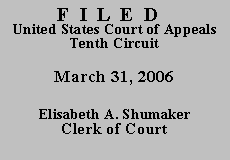

| DAVID L. MITCHELL,
Plaintiff-Appellant, v. JOHN LANGLEY, Supervising Producer; COPS-LANGLEY PRODUCTIONS; FOX BROADCASTING COMPANY, Defendants-Appellees.
DAVID L. MITCHELL, Plaintiff-Appellant, v. WICHITA POLICE DEPARTMENT; JAVIER E. GUETE, Police Officer, Wichita Police Department, Defendants-Appellees. |
|
On July 11, 2003, officer Javier Guete of the Wichita Police Department pulled over a car driven by Mitchell, who was under the influence of drugs and alcohol. A film crew from the Fox television show "Cops" accompanied officer Guete, and despite Mitchell's protestations, filmed Mitchell. While he was talking with Guete, a piece of rock cocaine fell out of Mitchell's mouth. Guete donned some used gloves, stuck a metal flashlight into Mitchell's mouth, and retrieved more cocaine.
Guete and a reporter then tried to convince Mitchell to sign a card, consenting to appear on "Cops." After refusing, Mitchell was taken to a police station and handcuffed to a bench for several hours. There, Guete and the reporter again tried to obtain Mitchell's consent, allegedly telling him that "things would go easy" if he signed the card. R. in Dist. Ct. Case No. 05-3331-SAC, Doc. 1 at 2. Mitchell signed, believing he would be allowed to go home. Instead, Mitchell was prosecuted and appeared on a May 1, 2004 segment of "Cops." Fox has since aired the segment several times.
On August 3, 2005, Mitchell filed a civil rights complaint against Fox and the producers of "Cops," seeking damages for, among other things, invasion of privacy. On September 21, 2005, Mitchell filed a civil rights complaint against Officer Guete and the Wichita Police Department, seeking damages for various injuries, including the loss of two teeth that resulted when Guete stuck the flashlight into Mitchell's mouth and Guete's use of dirty gloves to retrieve the cocaine. R. in Dist. Ct. Case No. 05-3378-SAC, Doc. 1 at 5. The district court consolidated the cases and then dismissed them as untimely. Mitchell appealed.
"In a civil rights action brought under 42 U.S.C. § 1983, we apply the applicable state statute of limitations." Price v. Philpot, 420 F.3d 1158, 1162 (10th Cir. 2005). In this case, Kansas's two-year statute of limitations, Kan. Stat. Ann. § 60-513(a)(4), applies. See Baker v. Bd. of Regents, 991 F.2d 628, 630 (10th Cir. 1993). But "federal law governs the accrual time for § 1983 claims," Smith v. Gonzales, 222 F.3d 1220, 1222 (10th Cir. 2000), measuring the time from "when the plaintiff knows or has reason to know of the injury which is the basis of the action." Smith v. City of Enid ex rel. Enid City Comm'n, 149 F.3d 1151, 1154 (10th Cir. 1998) (quotations omitted).
The district court concluded that Mitchell's § 1983 causes of action accrued in July 2003 when he was searched and allegedly coerced into signing a release to appear on "Cops." But since Mitchell did not sue within two years of that date, the district court found the causes of action time-barred. "We review the district court's application of the statute of limitations de novo." Van Tu v. Koster, 364 F.3d 1196, 1198 (10th Cir.), cert. denied, 543 U.S. 874 (2004).
We agree with the district court that any constitutional violation that might have occurred during Mitchell's search and signing of the release became actionable in July 2003 and time-barred in July 2005.(1) But Mitchell's appearance on "Cops" in May 2004 caused an alleged injury for which he sued within two years. Thus, the district court erred in dismissing as untimely Mitchell's § 1983 claims that derived from being shown on "Cops."
Nevertheless, § 1983 does not apply to private parties unless their conduct amounts to "state action," Rendell-Baker v. Kohn, 457 U.S. 830, 838 (1982). Mitchell pleaded in his complaint against Fox and the producers of "Cops" that there was no state action component. Thus, Mitchell failed to plead a viable § 1983 claim. See E.F.W. v. St. Stephen's Indian High Sch., 264 F.3d 1297, 1305 (10th Cir. 2001) (recognizing that a plaintiff must plead state action in order to proceed on a § 1983 theory).
The judgment of the district court is AFFIRMED.(2) We remind Mitchell of his continuing obligation to make partial payments until he has paid the filing fee in its entirety. See 28 U.S.C. § 1915(b).
Entered for the Court
Circuit Judge
*. After examining the briefs and appellate record, this panel has determined unanimously that oral argument would not materially assist the determination of this appeal. See Fed. R. App. P. 34(a)(2); 10th Cir. R. 34.1(G). The case is therefore ordered submitted without oral argument. This order and judgment is not binding precedent, except under the doctrines of law of the case, res judicata, and collateral estoppel. The court generally disfavors the citation of orders and judgments; nevertheless, an order and judgment may be cited under the terms and conditions of 10th Cir. R. 36.3.
1. To the extent Mitchell argues that the limitations period was tolled during the eleven-month period when "city hall" investigated the matter, Aplt. Br. at 2 (05-3395), we note that there is no requirement to exhaust administrative remedies before filing a 42 U.S.C. § 1983 suit that does not involve prison conditions, Porter v. Nussle, 534 U.S. 516, 523-24 (2002). Consequently, the eleven-month investigation period was properly counted as part of the two-year limitations period.
2. We may affirm on any grounds for which there is an adequate record, even grounds not cited by the district court. Gillogly v. Gen. Elec. Capital Assurance Co., 430 F.3d 1284, 1294 n.6 (10th Cir. 2005).